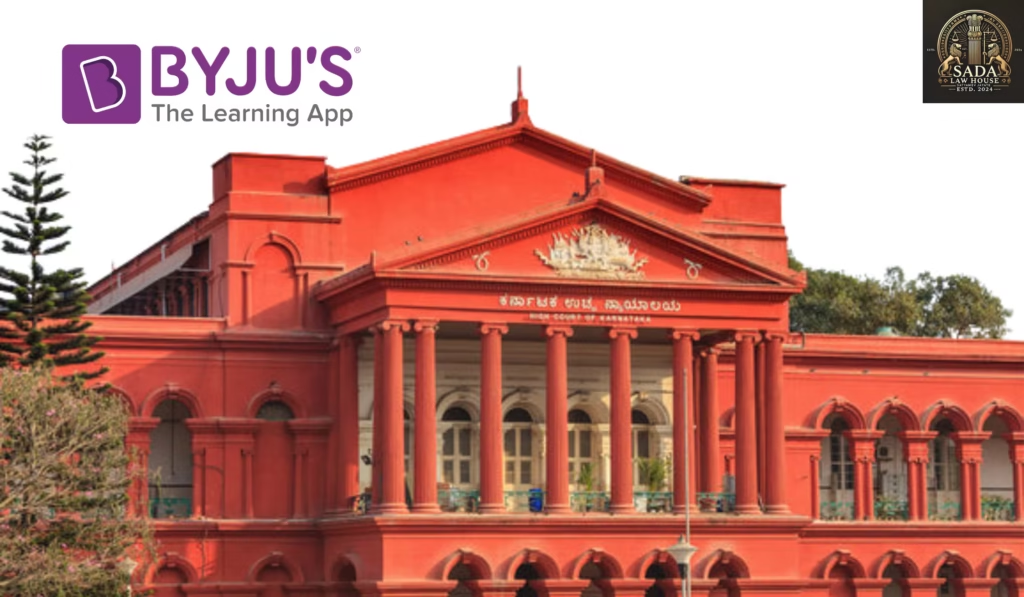Byju’s Withdraws Supreme Court Petition on Aakash Ownership: Karnataka HC Ruling Stands
Trending Today Byju’s Withdraws Supreme Court Petition on Aakash Ownership: Karnataka HC Ruling Stands Supreme Court Affirms Group of Companies Doctrine: Non-Signatories Can Be Bound by Arbitration Agreements Punjab & Haryana High Court Orders Removal of Unauthorized Gurudwara and Temple in Kharar Punjab and Haryana High Court Questions POCSO Court on Victim’s Surrender as Prosecution Witness in Rape Case Supreme Court Demands Action from CAQM Over Bandhwari Landfill Fires in Gurugram Supreme Court Upholds TDS on Salaries of Christian Nuns and Priests, Dismisses Review Petitions Actor-Activist Sushant Singh Moves Supreme Court to Transfer Petition Challenging IT Rules Petition Amid Social Media Blocking Dispute. Supreme Court Reviews J&K’s Plea Against HC Order Halting Detention of Alleged Overground Worker Amid Pahalgam Terror Attack India’s Supercar Boom: Lamborghini’s Growth Plans Amid Fastest-Growing Economy Power of Constitutional Courts in Granting Bail for Offenses with Stringent Bail Conditions: A Case Analysis of V. Senthil Balaji vs The Deputy Director Byju’s Withdraws Supreme Court Petition on Aakash Ownership: Karnataka HC Ruling Stands MAHI SINHA 04 May 2025 Byju’s withdraws its Supreme Court appeal challenging the Karnataka High Court’s ruling on Aakash’s ownership. Read the latest updates on the Think and Learn vs. Aakash case. Overview of the Byju’s vs. Aakash Ownership Dispute In a significant development, Think and Learn Pvt Ltd (operating the ed-tech giant Byju’s) has withdrawn its appeal in the Supreme Court of India. The appeal challenged the Karnataka High Court‘s ruling on the ownership of Aakash Educational Services, a subsidiary of Byju’s. This legal battle emerged after the National Company Law Tribunal (NCLT) issued an order to maintain the status quo on Aakash’s shareholding. Aakash contested this decision, resulting in the High Court overturning the NCLT’s directive. Supreme Court Proceedings The Supreme Court reviewed Byju’s appeal on May 2, 2025. Despite expressing concerns over the High Court’s jurisdiction in the matter, the apex court refrained from overturning the High Court’s decision. Key Observations by the Bench A two-judge bench comprising Justice Joymalya Bagchi and Justice P.S. Narasimha highlighted: “There was no justification for the High Court to exercise jurisdiction under Article 226 of the Constitution when the NCLT’s ruling could have been appealed before the National Company Law Appellate Tribunal (NCLAT).” However, the bench allowed Byju’s to withdraw its appeal, noting the sequence of events that followed. Senior Counsel P.S. Patwalia, representing Think and Learn Pvt Ltd, formally requested the withdrawal, which the court permitted. Timeline of Events March 27, 2025: The NCLT Bengaluru ordered Aakash Educational Services to maintain its current shareholding structure. April 8, 2025: The Karnataka High Court overturned the NCLT’s directive, ruling in favor of Aakash and remanding the case for reconsideration. April 30, 2025: The High Court’s interim ruling required Aakash to uphold its current shareholding until this date, pending further action by the NCLT. Implications for Byju’s and Aakash The withdrawal of Byju’s Supreme Court petition marks a pivotal moment in the ownership dispute with Aakash Educational Services. While Aakash has successfully defended its position, the matter now returns to the NCLT for further deliberation. This case underscores the complexities of corporate governance and the judicial process, particularly in disputes involving high-value mergers and acquisitions. Conclusion The resolution of the Byju’s vs. Aakash ownership case highlights the importance of due process in corporate disputes. Byju’s decision to withdraw its Supreme Court appeal reflects a strategic move to focus on NCLT proceedings rather than prolonged litigation. As the case progresses, it will serve as a crucial example of how businesses navigate India’s evolving legal and regulatory framework. Stay updated as this landmark case unfolds further, shaping the future of corporate governance in India. Leave a Reply Cancel Reply Logged in as Sada Law. Edit your profile. Log out? Required fields are marked * Message* Case Laws Supreme Court Affirms Group of Companies Doctrine: Non-Signatories Can Be Bound by Arbitration Agreements Supreme Court Affirms Group of Companies Doctrine: Non-Signatories Can Be Bound by Arbitration Agreements Sada Law • May 4, 2025 • Case law • No Comments Power of Constitutional Courts in Granting Bail for Offenses with Stringent Bail Conditions: A Case Analysis of V. Senthil Balaji vs The Deputy Director Power of Constitutional Courts in Granting Bail for Offenses with Stringent Bail Conditions: A Case Analysis of V. Senthil Balaji vs The Deputy Director Sadalaw Publications • May 2, 2025 • Case law • No Comments Tsewang Thinles vs UT of Ladakh: High Court Clarifies Special Court’s Power to Determine Victim’s Age Under POCSO Act Tsewang Thinles vs UT of Ladakh: High Court Clarifies Special Court’s Power to Determine Victim’s Age Under POCSO Act Sadalaw Publications • April 28, 2025 • Case law • No Comments 1 2 3 … 5 Next »
Byju’s Withdraws Supreme Court Petition on Aakash Ownership: Karnataka HC Ruling Stands Read More »


